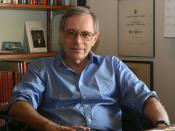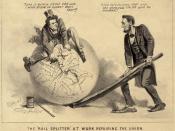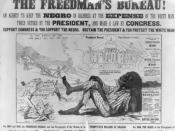The Reconstruction was a chaotic, bloody period where beliefs clashed violently with personal and political interests. This can, without a doubt, be observed in the three phases it consisted of: the Presidential Reconstruction (1863/1866 - where upon the idealists Abraham Lincoln and Andrew Johnson struggled to reunite the country, in the wake of the civil war); the Radical Reconstruction (1866/1873 - the Republicans took power, emphasized civil rights and voting rights for the Freed Men), and finally the Redemption (1873/1877 - The southerners resumed the control of each state, protesting against the indulgence of the black people.) In fact, the so-called "Redemption" was more of a backlash, since the white Southerners resumed political control; making claims such as "If the Negroes have the right to become free, the [planters] have the incontestable right not to be ruined by the Negroes' freedom." (Alexis de Tocqueville, quoted in Foner, 1983)Eric Foner is an extremely popular historian and his perceptive views on American History are just as remarkable as they are popular.
Regarding the historical period of the "Reconstruction", Foner feels that it was a task left unfinished, as implied in the subtitle of his book "Reconstruction: America's unfinished revolution." In this book, the author clearly elaborates upon his reasoning that only recently (after the 1960's), was our understanding of "race relations, politics and economic change during Reconstruction" (Foner 1988) clearly established, trough the combination of several factors (such as new historical evidences, coupled with a drastic change in the social role of African Americans.) In other words, he claims that it would take nearly a century until the ideological goals of the Reconstruction would effectively be observed.
Foner is quite instructive while exposing his belief that the revolution was suspended before it reached its assumed ideals of tolerance...



Reconstruction in the views of author E. Foner
In an essay such as this, I would expect the writer to show some familiarity with the substance of Professor Foner's brilliant book, "Reconstruction." The bibliographical entry suggests that this writer glanced in the introductory essay and skipped the reminder of the book. Well, if the essay is based solely on consideration of a three page essay in "American Heritage," and ignores one of the more noteworthy major studies on the topic, does the writer really expect to be taken seriously?
1 out of 1 people found this comment useful.